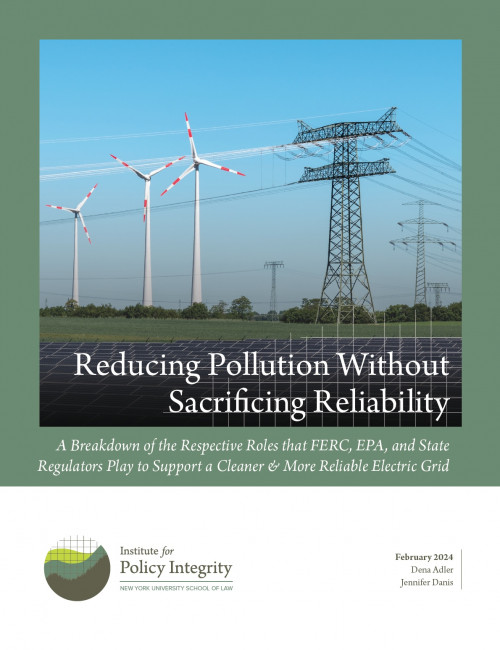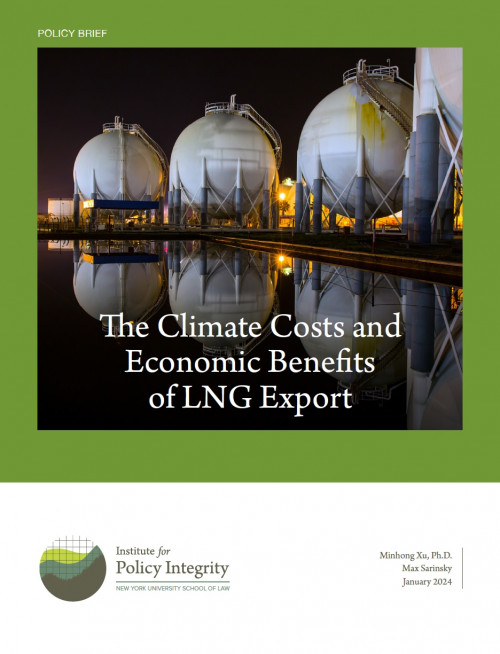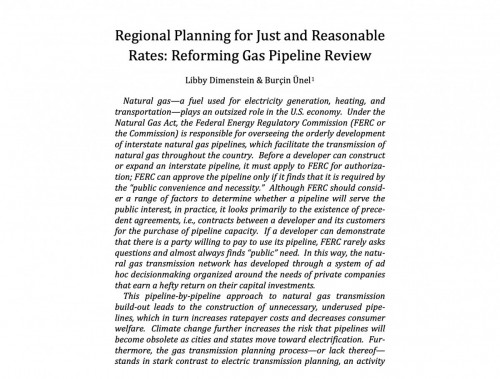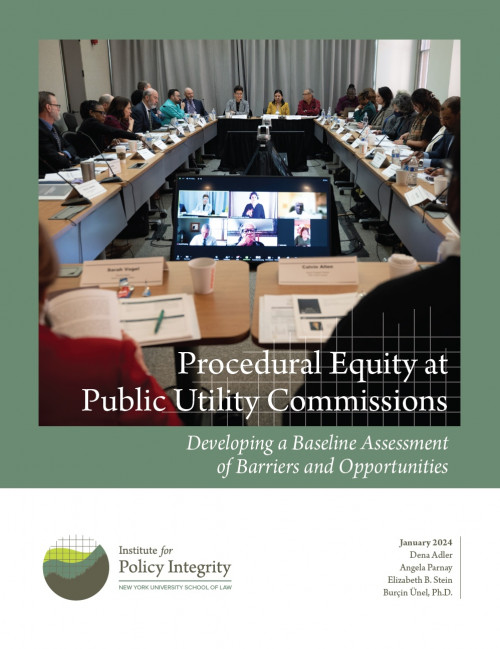-
Comments to NYSERDA on Proposed Cost-Effectiveness Test for Updates to the State Energy Conservation Construction Code
The Institute for Policy Integrity submitted comments to the New York State Energy Research and Development Authority (NYSERDA) regarding its proposal for a new cost-effectiveness test for updates to the state energy conservation construction code. We recommended changes and clarifications that NYSERDA and the Code Council can make to improve their evaluation criteria.
-
Comments to Treasury on 45V Clean Hydrogen Production Tax Credit
Policy Integrity commented on the Department of Treasury's proposed regulation to implement the Section 45V tax credit for clean hydrogen production from the Inflation Reduction Act. This tax credit subsidizes the production of hydrogen based on its emissions intensity. Our comments leveraged our expertise on the electric grid to advise Treasury on how to accurately measure the emissions intensity of hydrogen from grid-connected electrolyzers.
-

Reducing Pollution Without Sacrificing Reliability
A Breakdown of the Respective Roles that FERC, EPA, and State Regulators Play to Support a Cleaner & More Reliable Electric Grid
Multiple federal and state regulators must coordinate their efforts to ensure electric grid reliability, particularly during a period of major transition, and it is important to understand what role each of them plays. This report reviews the respective roles of FERC, RTOs/ISOs, other transmission operators, state public utility commissions, and state environmental regulators. EPA’s duty to reduce GHG emissions that endanger public health and FERC’s duty to steward grid reliability will require them to coordinate each other’s respective expertise as they work with RTOs/ISOs, state regulators, and utilities to implement EPA rules.
-
Comments to EPA on Draft Scientific Integrity Policy
On February 23rd, Policy Integrity submitted comments to EPA on its draft Scientific Integrity Policy. The draft Policy appropriately clarifies that economic analyses are protected by the same integrity policies as other scientific assessments, but it currently cites EPA's 2010 Guidelines for Performing Economic Analyses as the only example of a best-practice document that "should be followed" when assessing benefits, costs, and economic impacts. Several key elements of those 2010 guidelines are out of date, notably the recommendations on discount rates. Our comments offer a simple redline to ensure that other documents that meet the standards for objectivity--like the updated Circular A-4, or the pending ecosystem service guidance--could also fall under the Policy's proposed protections.
-
Comments to NYPSC on CLCPA’s Zero-Emissions Amendments to Public Service Law
Policy Integrity submitted comments to the New York State Public Service Commission (NYPSC) regarding the section of the Climate Leadership and Community Protection Act (CLCPA) that amends the Public Service Law to add a new section (Section 66-p), which requires, among other things, that, by 2040, “the statewide electrical demand system will be zero emissions.” NYPSC had posed several questions about how it should interpret the requirements for 2040 under the new Public Service Law provision.
-
Comments to CFTC on Voluntary Carbon Credit Derivatives Guidance
In December 2023, the Commodity Futures Trading Commission (CFTC) proposed guidance that identifies key features of high-integrity voluntary carbon credits (VCCs) for exchanges that list certain VCC derivatives. The Institute for Policy Integrity submitted comments that highlight additional sources of CFTC legal authority over these derivatives and suggest improvements to the proposed guidance’s discussions of additionality, leakage risk, quantification, risk of reversal, and exchanges’ discretion to set stringent standards. Finally, our comments recommend that the CFTC explore whether it has other authority to address issues with VCC integrity and whether to seek additional authority from Congress.
-
Comments to DOE and CPO a National Definition for a Zero Emissions Building
The Department of Energy (DOE) and the Office of Domestic Climate Policy (CPO) published a Request for Information on a National Definition for a Zero Emissions Building. The Institute for Policy Integrity at New York University School of Law (Policy Integrity) submitted comments through DOE and CPO's question-and-answer textbox format.
-

The Climate Costs and Economic Benefits of LNG Export
Gas provides nearly a quarter of the world’s total energy supply. As part of that supply chain, gas is shipped between continents in the form of liquefied natural gas (LNG). The United States is now the world’s largest LNG exporter following a surge in gas exports since 2016, but these exports have generated controversy due to their climate effects.This policy brief provides an analysis to support an effort to balance the full range of impacts from LNG exports. Using DOE’s own published studies, we compare the climate cost per unit of LNG export to the economic benefit (measured using consumer welfare). We find that climate costs likely exceed economic benefits. While the precise difference depends on several factors, gross climate damages greatly exceed economic benefits under all scenarios evaluated. These findings provide useful insights as DOE prepares to re-evaluate the LNG export program.
-

Regional Planning for Just and Reasonable Rates: Reforming Gas Pipeline Review
Published in the Columbia Journal of Environmental Law
Natural gas plays an outsized role in the U.S. economy. Under the Natural Gas Act, the Federal Energy Regulatory Commission (FERC or the Commission) is responsible for overseeing the orderly development of interstate natural gas pipelines, which facilitate the transmission of natural gas throughout the country. FERC can approve the pipeline only if it finds that it is required by the “public convenience and necessity.” Although FERC should consider a range of factors to determine whether a pipeline will serve the public interest, in practice, it looks primarily to the contracts between a developer and its customers for the purchase of pipeline capacity. If a developer can demonstrate that there is a party willing to pay to use its pipeline, FERC rarely asks questions and almost always finds “public” need. This pipeline-by-pipeline approach to natural gas transmission build-out leads to the construction of unnecessary, underused pipelines, which in turn increases ratepayer costs and decreases consumer welfare. Climate change further increases the risk that pipelines will become obsolete as cities and states move toward electrification. Relying on economic theory, legal history, and policy analysis, we make the case in this paper—pulished in the Columbia Journal of Environmental Law— for FERC’s adoption of regional gas transmission planning.
-

Procedural Equity at Public Utility Commissions
Developing a Baseline Assessment of Barriers and Opportunities
Combatting climate change will require major transitions in the energy sector. In the United States, state-level entities like public utility commissions play a key role in this transition. Commissions help decide where and when clean energy displaces fossil-fuel combustion, and how costs associated with energy system investments are passed on to consumers, so their actions can affect emissions outcomes as well as the health, energy, environmental, and affordability burdens faced by disadvantaged communities. Although many Commission processes incorporate some form of stakeholder input or participation, it is often difficult for the public to participate due to the technical and complex nature of these proceedings. These challenges present a procedural justice issue. In this report, we reviewed a range of practices for enhancing procedural justice at Commissions in nine states. This review was based on a structured survey of Commissions’ websites, resources available to prospective participants, and relevant statutes and regulations.
Viewing recent projects in Climate and Energy Policy








